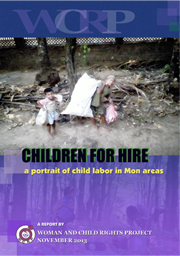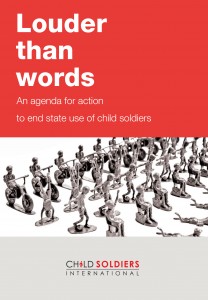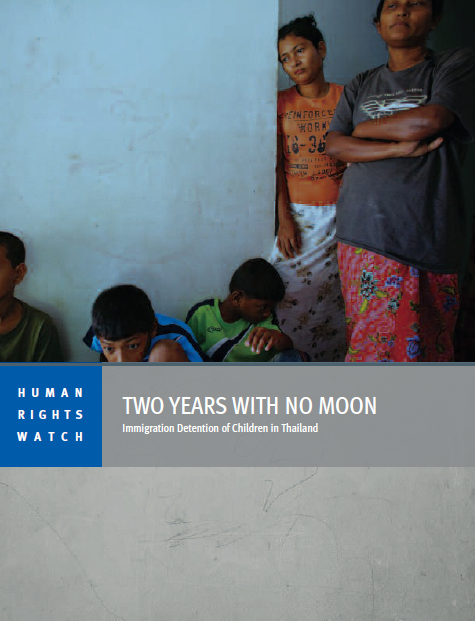Children and Youth (108 found)
WORLD REPORT 2015
Burma
The reform process in Burma experienced significant slowdowns and in some cases reversals of basic freedoms and democratic progress in 2014. The government continued to pass laws with significant human rights limitations, failed to address calls for constitutional reform ahead of the 2015 elections, and increased arrests of peaceful critics, including land protesters and journalists […]
• • •Myanmar: Further steps needed to end army’s recruitment and use of children
London, 23 January 2015 – The Myanmar government should promptly implement measures to honour its stated commitment towards ending child recruitment and use, Child Soldiers International said in a report released today. While some important steps have been taken since the government signed the June 2012 Joint Action Plan with the UN, research conducted by Child Soldiers International found that children below 18 years of age continue to be forcibly recruited and used in the Tatmadaw Kyi, the Myanmar army. The report calls on the government to urgently address serious gaps in age verification protocols, recruitment procedures and accountability mechanisms to ensure children are not recruited and used as soldiers in state forces […]
• • •Under the radar: Ongoing recruitment and use of children by the Myanmar army
 The Myanmar government should promptly implement measures to honour its stated commitment towards ending child recruitment and use, Child Soldiers International said in a report Under the radar: Ongoing recruitment and use of children by the Myanmar army. While some important steps have been taken since the government signed the June 2012 Joint Action Plan with the UN, research conducted by Child Soldiers International found that children below 18 years of age continue to be forcibly recruited and used in the Tatmadaw Kyi, the Myanmar army. The report calls on the government to urgently address serious gaps in age verification protocols, recruitment procedures and accountability mechanisms to ensure children are not recruited and used as soldiers in state forces […]
The Myanmar government should promptly implement measures to honour its stated commitment towards ending child recruitment and use, Child Soldiers International said in a report Under the radar: Ongoing recruitment and use of children by the Myanmar army. While some important steps have been taken since the government signed the June 2012 Joint Action Plan with the UN, research conducted by Child Soldiers International found that children below 18 years of age continue to be forcibly recruited and used in the Tatmadaw Kyi, the Myanmar army. The report calls on the government to urgently address serious gaps in age verification protocols, recruitment procedures and accountability mechanisms to ensure children are not recruited and used as soldiers in state forces […]
Open Letter to Mr. Barack Obama President of United States of America
We are writing to you to inform you about current situation in Myanmar and the reality on the ground from the perspective of young people. Allow us to get straight to what we want you to know. Current reform in Myanmar is fake. Changes that have happened are cosmetic to please the international community to attract investments to get the old regime out of economic isolation. We do not believe this reform process is going to take us anywhere because the motivation for reform is insincere. We want genuine democracy and national reconciliation […]
• • •Two Years With No Moon: Immigration Detention of Children in Thailand
Every year, Thailand arbitrarily detains thousands of children, from infants and toddlers and older, in squalid immigration facilities and police lock-ups. Around 100 children—primarily from countries that do not border Thailand—may be held for months or years. Thousands more children—from Thailand’s neighboring countries—spend less time in this abusive system because Thailand summarily deports them and their families to their home countries relatively quickly. For them, detention tends to last only days or weeks.
But no matter how long the period of detention, these facilities are no place for children.
Drawing on more than 100 interviews, including with 41 migrant children, documenting conditions for refugees and other migrants in Thailand, this report focuses on how the Thai government fails to uphold migrants’ rights, describing the needless suffering and permanent harm that children experience in immigration detention. It examines the abusive conditions children endure in detention centers, particularly in the Bangkok Immigration Detention Center (IDC), one of the most heavily used facilities in Thailand […]
• • •Children for Hire: A Portrait of Child Labor in Mon Areas
 The growing domestic and international attention being paid to child labor in Burma, also known as Myanmar, signals a vital step in the country’s reform and development process. The advent of new funding to research the scope of the problem, proposed amendments to labor laws, and popularized documentaries exposing the lives of working children have indicated fresh interest in revealing and reducing the incidence of child labor.
The growing domestic and international attention being paid to child labor in Burma, also known as Myanmar, signals a vital step in the country’s reform and development process. The advent of new funding to research the scope of the problem, proposed amendments to labor laws, and popularized documentaries exposing the lives of working children have indicated fresh interest in revealing and reducing the incidence of child labor.
However, the catalyst for this report was sparked by observations that these proliferating activities and discussions are often largely restricted to urban areas, particularly regarding the well-known prevalence of Burma’s “teashop boys.” While urban forms of child labor warrant immediate and effective interventions, the ambiguity that shrouds less visible forms of the practice, especially occurring in rural ethnic villages and communities tucked against the country’s vast borderline, necessitates targeted illumination. During several interviews conducted for this report, civil society members and child protection officers described child labor in Burma as vastly under-researched, and said that accurate data from the country’s peripheral areas is almost nonexistent […]
Briefing for the Security Council Working Group on Children and Armed Conflict Regarding the Recruitment and Use of Child Soldiers in Burma (Myanmar) and Implementation of the Joint Action Plan
Human Rights Watch has monitored the human rights situation in Burma (Myanmar) for 25 years, including violations against children affected by armed conflict. We have conducted two in-depth investigations of recruitment and use of child soldiers by both government forces and non-state armed groups, publishing our findings in My Gun was as Tall as Me: Child Soldiers in Burma in 2002 […]
• • •Chance for Change: Ending the Recruitment and Use of Child Soldiers in Myanmar
This report shows that despite nearly a decade of international engagement and the June 2012 signing of a Joint Action Plan to end the recruitment and use of children between the Myanmar government and the UN, children continue to be recruited and used as soldiers by the Tatmadaw Kyi […]
• • •Louder Than Words: An Agenda for Action to End State Use of Child Soldiers
 The report “Louder than words: An agenda for action to end state use of child soldiers” is published to mark the tenth anniversary year of the entry into force of the Optional Protocol to the Convention on the Rights of the Child on the involvement of children in armed conflict. It examines the record of states in protecting children from use in hostilities by their own forces and by state-allied armed groups. It finds that, while governments’ commitment to ending child soldier use is high, the gap between commitment and practice remains wide. Research for the report shows that child soldiers have been used in armed conflicts by 20 states since 2010, and that children are at risk of military use in many more […]
The report “Louder than words: An agenda for action to end state use of child soldiers” is published to mark the tenth anniversary year of the entry into force of the Optional Protocol to the Convention on the Rights of the Child on the involvement of children in armed conflict. It examines the record of states in protecting children from use in hostilities by their own forces and by state-allied armed groups. It finds that, while governments’ commitment to ending child soldier use is high, the gap between commitment and practice remains wide. Research for the report shows that child soldiers have been used in armed conflicts by 20 states since 2010, and that children are at risk of military use in many more […]
‘Threats to Our Existence’: Persecution of Ethnic Chin Christians in Burma
This new report “‘Threats to Our Existence’: Persecution of Ethnic Chin Christians in Burma” by the Chin Human Rights Organization (CHRO) exposes a decades-long pattern of religious freedom violations that persist today under the new government, and documents other serious human rights abuses such as forced labour, torture, and other cruel and inhuman treatment, forcing thousands of Chin to flee their homeland […]
• • •

 All posts
All posts